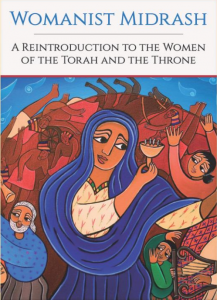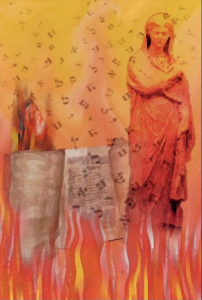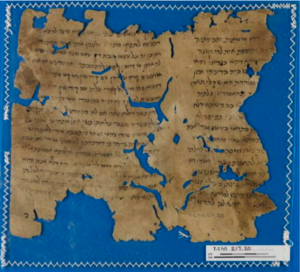Women in the Talmud: Meet Yalta, the first Jewish feminist
“Miriam” by Laura James. Cover art for “Womanist Midrash: A Reintroduction to the Women of the Torah and the Throne” – Wilda C. Gafney. Published by Westminster John Knox Press, National Library of Israel collections
Published March 7, 2023
If you haven’t heard of Yalta yet, it’s okay – many people haven’t. But as the second most mentioned woman in the Talmud, Yalta does deserve more fame, especially as her daring escapades left many speechless. Often described as the ‘first Jewish feminist,’ Yalta was a leading woman of the time, going around smashing barrels of wine, adjudicating for women’s issues, contradicting the highest regarded rabbis, and rewriting ancient laws to finally include women in Jewish practices.
There is a general frustrating tradition to render women in the Talmud nameless. At most, one can occasionally expect a side note mentioning “the wife of so and so.” But amongst the few named women in the Talmud is a strong-willed, brave person who could reliably be described as Judaism’s first feminist – or at least the first Jewish feminist to be so outspoken about her beliefs.
| RELATED: The amazing story of Queen Esther

The Babylonian Rabbi, Rabbah bar Avuha, was a student of the famous Rav – Abba bar Aybo – and a sage in the second generation of the amoraim, the Jewish scholars who lived from 200-500 CE and codified many of the teachings of the Oral Torah. He resided in Babylonia where he became a religious judge. Rabbah bar Avuha was also related to the exilarchs, the leaders of the Jewish community in Persian Mesopotamia, and may have been an exilarch himself. This afforded him prominence as both a rabbinical authority and a nobleman within Persia. According to legend, he was also a friend of the prophet Elijah who gave him leaves from paradise, making him rich, but it’s up to you to decide for yourself whether he gained his wealth through his political prowess, or encounters with prophets in the Garden of Eden.
Either way, he was able to provide a nice quality of life, by 200 CE standards, for his family. His family included one daughter with a larger-than-life personality: Yalta. This very Yalta is the second most-mentioned woman in the Talmud (the first most-mentioned woman in the Talmud is the daughter of Rav Chisda.)

But before we get to Yalta, we must first meet her husband – in an article about feminism it is a tad ironic to insist on putting the man first, but chronology is chronology!
Rav Nachman bar Yaakov was a student of our friend Rabbah bar Avuha, and he also served as the chief justice of the Jews who were subject to the exilarch, so in a way the two men were also contemporaries. Rav Nachman certainly had his own achievements, including being the head of the school of Nehardea, but he had a slightly wacky personality, to say the least. For one thing, his ego was sizable (Sanhedrin 98b, Sanhedrin 5a, Bava Metzia 66a). He also had a raging superiority complex and would treat those who he saw as below him (which was nearly everyone) poorly.
When Rabbah bar Avuha’s yeshiva was destroyed, Rav Nachman offered him the head position at his own school. In return, Rabbah bar Avuha offered him a wife. A fair trade, don’t you think? Thus it was that Yalta married Rav Nachman, and they lived happily ever after, enjoying a great degree of comfort.

But it wasn’t always a quiet life, for, as mentioned, Yalta was a bright spark and would often stand up for what she believed in. Many stories can be told to exemplify her fiery character, but none is so prominent as the story told in Berachot 51b. Yalta and her husband were hosting a meal in their home, at which the renowned Rabbi Ulla was eating. After saying their blessings upon concluding the meal, men and their guests would pass around a Cup of Blessing filled with wine, giving each recipient the chance to say a prayer for their own good fortune. On this occasion Rabbi Ulla was given the honor of leading the blessing, and once he was finished, he ignored Yalta and gave the cup straight to Rav Nachman. Rav Nachman, a loving husband, or perhaps a husband seeking to avoid a marital dispute, asked Ulla to pass the cup to Yalta.

Ulla replied “The issue of a woman’s womb is blessed only through the issue of a man’s belly (Deuteronomy 7:13.)” In effect, Ulla was telling the table that women only conceive because of the blessings of their husbands, and that it is pointless and even wasteful to include women in the sacred Cup of Blessing practice as their spiritual satisfaction can only come via a man. He also relegated womankind in supposing that all they should be concerned to pray for is childbirth, and ignored the fact that maybe Yalta wanted to pray for something other than having children – (gasp!) To avoid all doubt, it is worth mentioning that Ulla’s claims were unfounded and his exclusion of women directly contradicts what is relayed in the Torah itself, but that’s not the point here.

Yalta was furious. She stood up from the table, ran into the storeroom, and smashed 400 barrels of wine, obliterating hundreds of cups of wine at the refusal of her one. Rav Nachman implored Ulla to reconsider his decision to ostracize Yalta and Ulla reluctantly obliged, but he wasn’t going to go down so easily. Ulla found a new, comically large and less beautiful cup and handed it to Yalta for the blessing, mocking her request to join in and branding it as greedy. This unsubtle dig seemed to be aimed at women in general, as if to ask – “You want wine now too? Is it not enough that you get the privilege of serving men while owning nothing and being someone else’s property? Fine – I’ll give you wine! I’ll give you loads of wine!” But don’t worry, Yalta wasn’t going to stand for his mockery, and demanding the last word, she took the cup from him while proclaiming “from travelers come tall tales and from rag pickers lice,” in effect completely illegitimizing both Ulla’s opinion and character.

Maybe breaking so many barrels of wine seems a tad overreactive, but a second opinion states that she only broke the seals on the barrels. Yalta was upset that she wasn’t able to partake in the sacred act of blessing, and she wanted to show that her desire was not in vain but in a noble effort to include women in this commandment. The Torah teaches that when something is destroyed for a reason (including to teach a lesson), there is a lift on the prohibition of wanton destruction. Moreover, the number 400 has the same numerical value as ayin hara, “the evil eye”. Ulla had acted in an unjust way, so to show him what real justice meant, Yalta broke the seals on the barrels of wine and distributed their contents to underprivileged people, so that they could use the wine at their own meals.

Yalta wasn’t just concerned with expressing her opinions in alcohol-related escapades. At a time when a woman having an opinion was unthinkable, let alone unheard, Yalta would actually advise her husband on different matters. On one occasion (Kiddushin 70b,) she instructed Rav Nachman to distance himself from those who wouldn’t respect his opinion, and he obliged, going as far as to show one adversary a note with Yalta’s advice and explaining that he would defer to his wife and leave the uncivil discussion at once.

This brave woman didn’t always need her husband to stand up for her, though. When she received a ruling from a rabbi concerning her menstruation and the Jewish laws of family purity, she felt dissatisfied with the rabbinical ruling. Not one to simply accept her fate, she took matters into her own hands and sought out a new Rabbi who would give her an answer that she could accept (Niddah 20b.)
Yalta was able to understand that she hadn’t been given an optimal ruling by the first rabbi because of her vast medical knowledge (Gittin 67b) and understanding of the intersection between Jewish law and medical ethics, an area of study still being discussed today, 1800 years later! Yalta was educated by her father, to the shock of many, and became a learned woman. Had she been born a mere few thousand years later she might have become a doctor or a scholar herself. As it was, she had to be content standing up to rabbis and making religious rulings for herself (Chullin 109b.)

It was perhaps because of this that her guidance was so sought out by those around her, especially women (surprise surprise!) In fact, her guidance was so necessary to her community that on Shabbat, when it was generally forbidden to carry anyone in a sedan chair, her ever-doting husband allowed Yalta to be carried into town to speak to her disciples (Beitzah 25b.)

What is interesting is that Yalta’s husband wasn’t exactly at the forefront of the feminist movement himself. One might go as far as calling him a misogynist, and they would have serious reason to do so. While serving as the judge in a theft trial, he dismissed the claims of the wronged party (Sukkah, 31a.) Having had her business stolen from her she was understandably distressed. But Rav Nachman dismissed the entire case with a crass statement that “she is a noisy woman.”
And it is true that Rav Nachman was not much one for outspoken women. He even went so far as to decry prophets themselves for the simple sin of being female. “It is not seemly for women to be conceited” he said, continuing that “the two prophetesses Deborah and Huldah had hateful names, namely, ‘bee’ and ‘weasel’” (Megillah 41b.) Even the women anointed with prophecy by G-d himself were, sadly, still women in the eyes of Rav Nachman and thus should not have been speaking in public, unlike his wife.

If this is how he spoke of the prophetesses, you can imagine how he treated his female slaves (reportedly, his treatment was – “without regard to their moral sensibilities.”). So how could he stand up for his wife’s blatant acts of empowerment while vilifying the other women around him? One might guess that it was love which drove him to abandon his sexism and support his wife, but Rav Nachman was certainly not so loyal to Yalta. Once, when traveling to the city of Shchenziv he told his men to bring him a woman who could act as his ‘wife’ during his time in the city. His plan was to divorce her when he left the town and return to the none-the-wiser Yalta at home (Yoma 18b.)
So if it was not love, what did draw Rav Nachman to Yalta, this proto-feminist of huge proportions? Feminist scholars flocked to Yalta’s ideas (Niddah 20b) about the laws of niddah (Jewish laws pertaining to menstruation,) and even today’s rabbis sing praises for the revolutionary standpoints of Yalta.
Maybe it was her “assertiveness and forcefulness” which scared Rav Nachman into doing what she said? Maybe we can believe the theory that he only married her after her former husband’s demise, and both age and pity led him to accept her nature? But the favored answer is that he was simply aware of her goodness and truthfulness. Yalta’s very name means truth. The numerical value of the name Yalta adds up to 441, which is the same value as the Hebrew word for truth – emet. As Ben Yehoyada said “her proper and truthful actions spoke for themselves.”

What is certain is that Yalta broke the glass ceiling before we even had a term for it. She wouldn’t have called herself a feminist because the movement hadn’t even been thought of, let alone vocalized. But being the second most mentioned woman in the Talmud comes with a responsibility to stand up for womankind and in this respect it’s fair to say that Yalta exceeded with flying colors.















